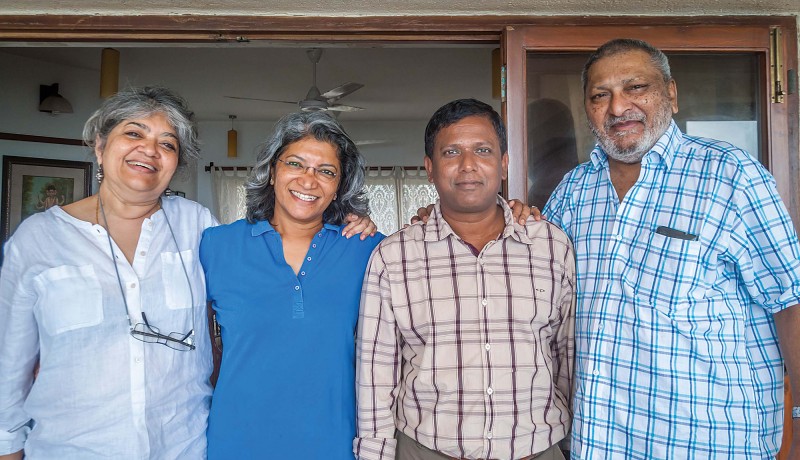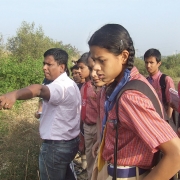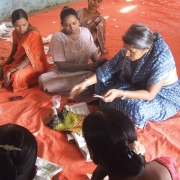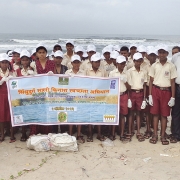
People

Shail D meets the founders of Vanashakti, whose battle against wanton development in Maharashtra has kept it at the forefront of the green movement
It was a routine catch-up session over dinner, where alongside the usual banter and chatter, there was annoyance over the state of affairs that affects citizens on a daily basis. Instead of letting the lament fade into the night, as it usually does at such gatherings, this one turned into one of Mumbai’s diehard environmental movements.
The three friends who had sat down to chat over supper almost a decade ago—Meenakshi Menon (57), Namita Roy Ghose (65) and Peter Menon (66)—founded Vanashakti, a Mumbai-based NGO, later that year. And they have since campaigned against the sweeping environmental damage that some of the biggest developmental projects are causing in Mumbai and other parts of Maharashtra. Among their more high-profile campaigns are the Save Aarey movement; opposition to the proposed Coastal Road in Mumbai; and protection of the Sawantwadi- Dodamarg wildlife corridor in the Western Ghats.
Vanashakti has also fought pitched battles to save the wetlands in Navi Mumbai, Bhandup and Thane; raised awareness on the condition of the Ulhas River; fought tooth and nail to save the sanctuary for flamingos in Sewri in Mumbai; and raised awareness about the lack of adequate handling of waste by the Brihanmumbai Municipal Corporation.
“I think middle-class India’s problem has always been that we want somebody else to solve our problems,” says Meenakshi. “We will say the police or the government isn’t doing their job. It’s always somebody else who didn’t do it. Do we ever ask ourselves, ‘What did I do?’ What gives me the right to make these demands when I’m not willing to do something about it?”
When the trio launched their NGO, they had little idea where to start or whom to talk to. “We had no money and no manpower, didn’t know who to approach or how to file a PIL. And we had no experience dealing with government machinery,” rues Namita.
To raise funds in 2013, they ran the Mumbai marathon wearing matching T-shirts and fluorescent-green clown wigs, chanting, “Van hai toh jeevan hai.” [Our lives depend on our forests.] “Strangers joined us, along with friends and clients; even my driver contributed to the run,” adds Namita. “We managed to raise close to ₹ 300,000 that year,” she explains.
So, the founders learnt as they went along, bringing their own respective set of skills to the table. Meenakshi, an advertising, marketing and media professional, found that the way the government spreads its message was very similar to what advertisers do. “In my industry, I see a lot of pretence and make-believe. Advertising is the business of playing with people’s emotions and identities.”
Peter, who has been a part of industries such as hospitality, tourism, software development and transportation, has been taking care of web development and ensuring all emails are read and responded to on time. Namita, a filmmaker with her own production company, lends her skills by shooting short films and campaign material whenever required, which helps get the message across.
At present, Vanashakti is slap-bang in the middle of a strident campaign to prevent the Maharashtra government from allowing Mumbai’s only green lung—Aarey Milk Colony, which is a part of the larger Sanjay Gandhi National Park (SGNP)—from being devastated by the construction of a car shed for Mumbai’s ambitious Metro III project.
The NGO first filed a petition in court to hold off the felling of trees and then handed the government seven alternative sites for the car shed. The matter went to court after the authorities rejected the proposals of their own experts on the matter. The court too ruled in favour of the NGO and asked why the experts’ report wasn’t being adhered to. “If the metro car shed comes up inside Aarey, real estate will instantly start cropping up around it. It is obvious that they are doing this to please developers,” says Dayanand Stalin, director (projects) with the NGO. The struggle continues to date.
Vanashakti is no stranger to pitched battles. One of the first issues it addressed was the Forest Rights Act (FRA) proposed by the Central Government in 2006 for the betterment of tribals living on forest land across the country. The act essentially allowed tribal populations to access produce from the forest and gave them a sense of ownership toward the land. “However, along the way, politicians came in and completely twisted the FRA, which became nothing but an attempt at organised land grab,” explains Meenakshi. “We were criticised for being anti-tribal but we knew exactly what was going to happen.” Peter adds, “They were talking about giving 4 hectare of land to each tribal. This was nothing but an opportunity to encash the land, especially those near urban centres.”
So, the team decided to make a short film highlighting the issue. “We got kids to hold up placards seeking answers to our questions and Meenakshi went down to the television networks and requested them to run it,” says Namita. “The subject then came up in Parliament and it forced the authorities to take a step backwards. For us, this was huge.” Adds Stalin, “Because of the opposition we generated, the clause for critical wildlife habitats was introduced. It means there will be an area inside every forest or sanctuary kept inviolate for the protection of wildlife. However, so far, only the land has been distributed—the demarcation of the critical wildlife habitat is still to be done.”
Among Vanashakti’s biggest achievements is securing the Sawantwadi-Dodamarg wildlife corridor in the Western Ghats. A proposal to set up 30-odd mines along this stretch had threatened the survival of this eco-sensitive zone in the south Konkan region, which connects three wildlife sanctuaries. The NGO worked with local communities to raise awareness and educated them on the effects of mining, in order to include their voices in the fight. In 2013, their efforts were rewarded when the Bombay High Court declared the region an ecologically sensitive area, which put an end to the mining proposal. “Mining would have completely destroyed the forest, wildlife and rivers in the area,” says Stalin. “Today, this entire region is secure and a tree felling ban has been put in place. It’s a huge achievement because we have managed to keep out the miners.”
Court battles take up a large part of their time. In fact, among all NGOs across Maharashtra and Goa, Vanashakti has the largest number of pending litigations, at 21. Over time, their team has expanded to nine other members in addition to the three founders, and they tie up with other NGOs when the need arises.
“Local communities are our eyes and ears,” explains Stalin. “Whenever they bring something to our attention, we send across our volunteers to go and have a look if we cannot make it ourselves. By the end of the day, I have photos and a report on what is happening. Volunteers play a huge role at Vanashakti.”
Vanashakti believes in pre-emptive strikes, before damage is done. For instance, it is opposing the proposed coastal road in Mumbai that would irreversibly devastate mangroves along the city’s coastline, among a host of other problems. In any case, they point out, the road, which is proposed to be built parallel to Mumbai’s shoreline, will not solve the city’s traffic problems.
Although feasibility studies are still being conducted and the road is being debated upon, Vanashakti is keeping a hawk eye on the matter. “They say the Bandra-Worli Sea Link has made a difference for everybody—but who is this everybody? It’s just 4 per cent of the population,” says Meenakshi. “The people who make decisions like this should travel by public transport to realise this. The same money they want to spend on a coastal road could be used to set up an elevated rail line.”
Vanashakti also raises awareness among students, teachers, corporate houses and housing societies in Mumbai by conducting workshops and lectures. The team visits schools and addresses children on diversity and wildlife issues, while corporate folks have been part of clean-up campaigns in the past. Housing societies are educated on water harvesting and garbage segregation.
Testifying to the NGO’s ability to inspire, Clara Correia, a professor of zoology at St John the Baptist High School and Junior College in Thane, says. “I take my students out for fieldwork to give their classroom learning a practical feel. During one such outing, I noticed debris being dumped on the wetlands in Thane. I had heard of Vanashakti and after finding them online, got in touch with Stalin. He went out of his way to help me with the issue; their team is fantastic. People need to get out of their comfort zone and speak out against such issues.”
Harish Pandey of the New Link Road Residents’ Forum also vouches for the NGO. “Mumbai has only a few green areas—Sanjay Gandhi National Park, Aarey Colony and a flamingo sanctuary. A lot needs to be done to protect these areas. Our development activities need to be sustainable, and Vanashakti is doing important work to see that this happens. Their work has been relentless.”
Clearly, the NGO’s message has impacted hearts and minds, far and wide. When Namita visited Tokyo for a conference and spoke about Vanashakti’s work, she received a call from a local who wanted to help. The person’s family had been manufacturing farming implements for generations and said he would like to send over a set of tools. A month later, a carton of hoes, spades and trowels reached their office in Mumbai. “It was only then that I realised that the first batch had been just a sample,” she says with a laugh. “The fact that someone halfway across the world believes in your work means you are having a positive effect. That ripple effect can change a lot of things.”
But the journey has not been without challenges. When facing off with the mainstream notion of progress and development, conveying the message to people has not been easy. “The idea that time is running out and short-sighted actions have consequences has been difficult to get across,” says Namita. While well-meaning friends said they were too small to make any difference, not so well-meaning friends “pooh-poohed” the work, even terming it “anti-development”. “We’ve been called a bunch of do-gooding dilettantes with no idea of ground reality,” she chuckles.
Battling perception seems like child’s play when compared to threatening phone calls and physical attacks; yet for the members of Vanashakti, it is simply an occupational hazard. “These are just small irritants. What kept us going were the results that started to show owing to the team’s unstinting efforts,” says Namita, visibly satisfied.
Their efforts have not gone unnoticed. “Meenakshi is more than just one of India’s finest creative communicators,” says Bittu Sahgal, founder-editor of Sanctuary Asia, a nature conservation magazine. “She has a clear head and a green heart that beats for our planet. And Stalin is one of these brave, determined people whose being is programmed to function on autopilot in defence of wild India.”
Indeed, nine years down the line, Vanashakti’s battles have grown larger and its approach to each case has been refined. Still, some of the initial challenges remain. “When we go to a new area, people look at us askance. There are usually people on both sides of a fence when it comes to a development project, so we have to be careful. First, we must identify the locals who’d be interested in hearing our side and slowly earn their trust. So each on-ground project takes time to initiate but we keep at it,” says Stalin.
While Stalin takes charge of the NGO’s everyday activities, the founding members play an advisory role when it comes to choosing projects, overseeing the NGO’s activities and actively raising funds for Vanashakti.
Namita continues to produce and direct films under the banner of her production house, White Light Moving Picture Company, and recently finished writing her first novel. In addition to her day job in media auditing at Spatial Access, Meenakshi runs an organic farm and is co-founder of Social Access Communications, a communications company for projects to fuel social change. Peter, who has settled into retirement, spends his time reading, writing and developing web content.
As for Stalin, he’s got plenty on his hands. He says, in an urban setting like Mumbai, the need of the hour is for development to coexist with the environment. “A lot of people think that construction and concretisation are a must for humans to survive,” he explains. “We are not opposing development but we believe there is always a way to reduce the adverse effect that a project or a particular activity may have on the environment. That’s the message we are trying to drive home.”
Photograph by Shail D Archival photo courtesy: Vanashakti Featured in Harmony — Celebrate Age Magazine November 2016
you may also like to read
-
For the love of Sanskrit
During her 60s, if you had told Sushila A that she would be securing a doctorate in Sanskrit in the….
-
Style sensation
Meet Instagram star Moon Lin Cocking a snook at ageism, this nonagenarian Taiwanese woman is slaying street fashion like….
-
Beauty and her beast
Meet Instagram star Linda Rodin Most beauty and style influencers on Instagram hope to launch their beauty line someday…..
-
Cooking up a storm!
Meet Instagram star Shanthi Ramachandran In today’s web-fuelled world, you can now get recipes for your favourite dishes at….










